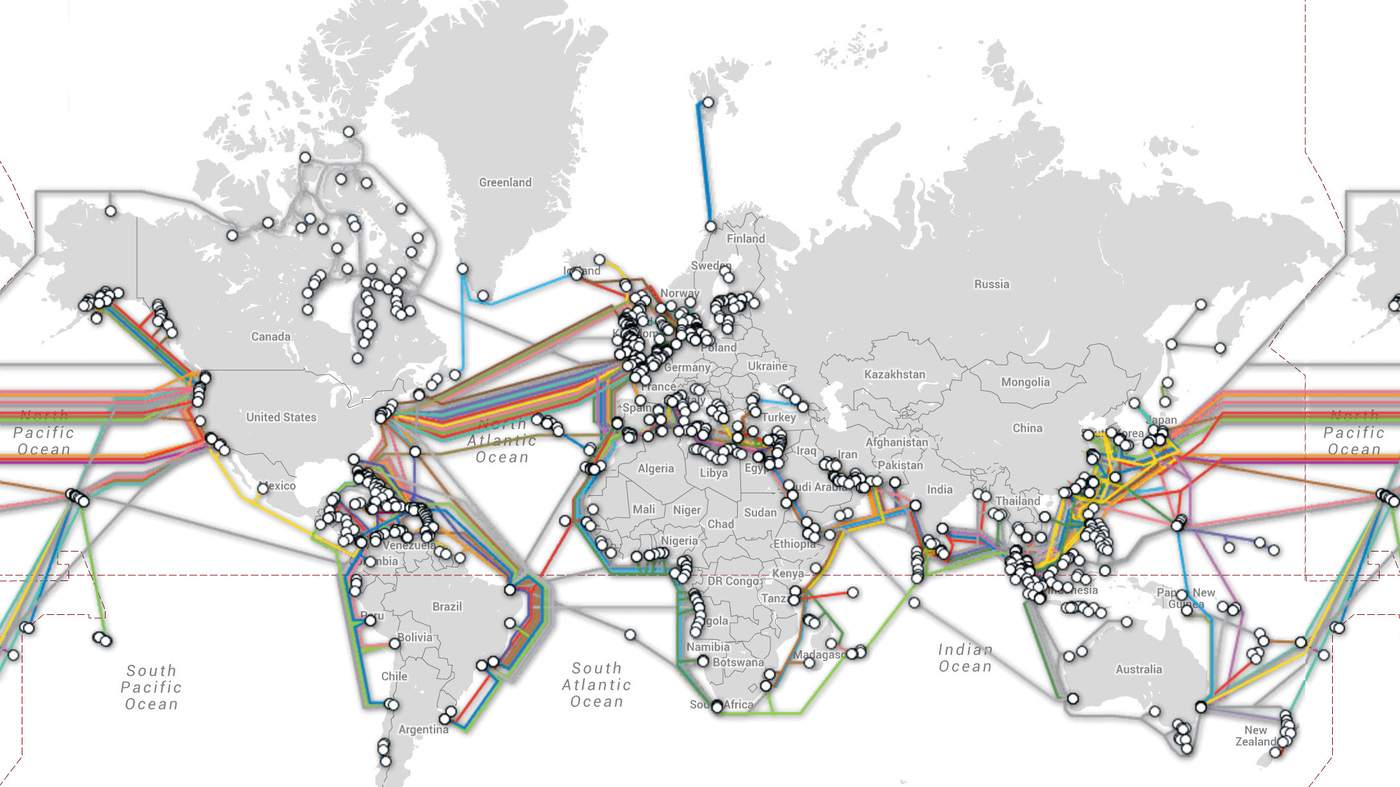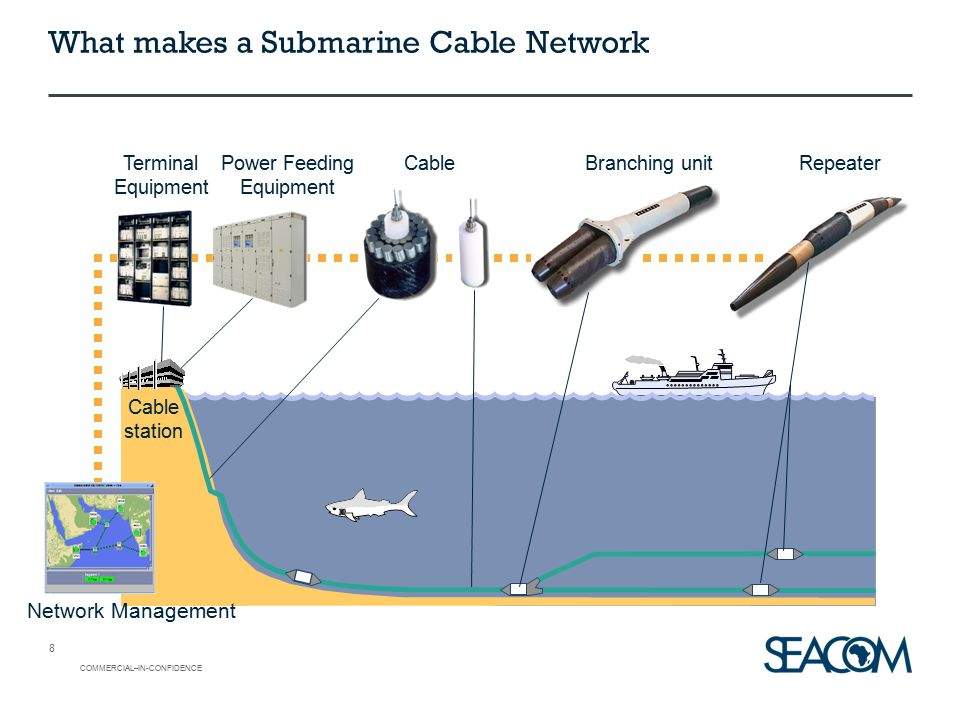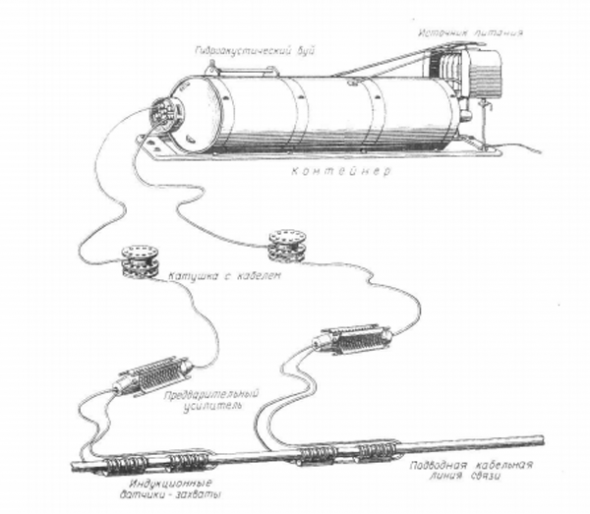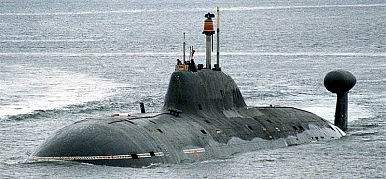Recent “be afraid of Russia” propaganda includes scary stories about Russian submarines prowling around submerged cables.
The new cold war is sort of like “double secret probation” cold war: it’s a cold war that we’re not even going to admit is taking place, therefore not only can people not ask “why?” they don’t even know what to ask. Characteristic of the first cold war, the new cold war depends on lies: the Russians are doing bad stuff so we need to spend money or deploy troops or something, in order to stop them. It may even be true, but it’s lies by omission. [wapo]
Standard picture of scary Russian submarine
BRUSSELS – Russian submarines have dramatically stepped up activity around undersea data cables in the North Atlantic, part of a more aggressive naval posture that has driven NATO to revive a Cold War-era command, according to senior military officials.
The apparent Russian focus on the cables, which provide Internet and other communications connections to North America and Europe, could give the Kremlin the power to sever or tap into vital data lines, the officials said. Russian submarine activity has increased to levels unseen since the Cold War, they said, sparking hunts in recent months for the elusive watercraft.
“We are now seeing Russian underwater activity in the vicinity of undersea cables that I don’t believe we have ever seen,” said U.S. Navy Rear Adm. Andrew Lennon, the commander of NATO’s submarine forces. “Russia is clearly taking an interest in NATO and NATO nations’ undersea infrastructure.”
NATO has responded with plans to reestablish a command post, shuttered after the Cold War, to help secure the North Atlantic. NATO allies are also rushing to boost anti-submarine warfare capabilities and to develop advanced submarine-detecting planes.

Map of submarine cable systems and their landing stations.
What’s more than slightly goofy is that the “command post” that is being ‘re-established’ after being ‘shuttered’ after the cold war is a cyber war command post. [wapo] Oh, got it: it’s not “defensive” activity, at all. The US and its allies have no idea how to defend in cyberspace, all they do is attack. There are other parts of the story that are being de-emphasized: the underwater cables carry civilian traffic; if there is NATO “undersea infrastructure” at play here, it’s because NATO made the mistake of piggy-backing military communications atop civilian infrastructure. That’s not to say that’s not a highly prevalent thing – it happens all over the place because laying private fiber is expensive – but placing civilian infrastructure at risk in order to save money on military infrastructure is suspiciously like putting one’s antiaircraft battery next to a hospital in order to save on parking. One of the problems with cyberwar is that it blurs the lines between military and civilian on both the offensive and defensive side of the equation: preparing to attack almost always means attacking the target’s civilian infrastructure, defending one’s own systems means taking civilian infrastructure exposure into account. If you’ve been watching what’s been going on in US cybersecurity policy, the government’s attempts to help fortify civilian infrastructure consist of: complaining a great deal about Russia, China, and North Korea.

It oughtn’t shock anyone at all to know that fiber-laying is big business and there are plenty of companies that specialize in sending people down into dark, cold water to debug, repair, or destroy lines. There is an entire ecosystem of companies that provide branching units, power repeaters, base power feeding, etc. It’s probably a given that the US NSA is tapping the hell out of fiberoptics into and out of certain places; perhaps they’re worried that the Russians are looking for unexpected branching units on their fiber? Or are they worried about unexpected branching units on US fiber? Either way, it was a bad game to get into, in the first place – though it was probably inevitable that someone would get into that game, eventually.
Frankly, any country that doesn’t expect their cable infrastructure to be attacked if they get in a tiff with a 1st world power, has probably been asleep at the cyberwar console.
Could Russia, or anyone else, cut undersea cables? Of course they could. They could also drop bombs on the termination-points – which is what the US appears to do when they go to war, nowadays. When the US launches an attack to “degrade command and control networks” that usually means that they just bombed some country’s civilian communications infrastructure to rubble; in case you have any questions, that was what the first tomahawk cruise missiles to hit Iraq did. There is no line between civilian infrastructure and military infrastructure any more; to be fair, in the US’ viewpoint, there never has been. That dates back to World War II.
It’s part of economic spoiling operations (AKA: “cold war 2.0”): [wm]
Egyptian Authorities Capture 3 Divers Trying To Cut Undersea Internet Cables
At the time, cable operator Seacom said several lines connecting Europe with Africa, the Middle East and Asia were hit, also slowing down internet services, reported Reuters news agency.
The cable hit in Wednesday’s apparent sabotage was the South East Asia Middle East Western Europe 4 (SEA-ME-WE 4) – one of the main cables snaking under the Mediterranean, Mena said.
The attack took place some 750m (820 yards) north of Alexandria, it said.
In the statement on his official Facebook page, Col Ali said the divers were arrested while “cutting the undersea cable” of the main telecommunications company, Telecom Egypt.

that’s a lot of armor on that cable
I couldn’t find any resolution regarding the divers: who were they? Who did they work for? This is not a leisure-time activity like bashing mailboxes with a baseball bat; one does not simply wake up one day and decide to undertake a dangerous dive with specialized gear so that they can make facebook a bit slower. Being the cynic I am, I assume those divers were not Russian because – if they were – it would be all over the news.
You’d think that there would be bulk encryptors at each end of a cable; that would also provide a nice way of detecting if someone began altering or injecting data. But, given how lame security tends to be, I’d be willing to bet that someone screamed “Eee! encryption will slow things down!” and the traffic is mostly plaintext. That’s how it is. That’s how it has been.
To get some perspective, we need to go back to Operation Ivy Bells, in 1969(?)-1970(?) [ib] back around the time when Cousteau was shaking the bubbles out of mixed-gas deep diving. I was an avid reader of National Geographic back then and I remember one volume had pictures of a military submarine with a “long term pressure chamber” for research in submarine rescue. I haven’t been able to find that issue, but there was a great deal of research being done in 1966+ on deep-diving and operations at the continental shelf depth. [Search for Conshelf I – III for some really interesting stuff!] While Cousteau’s teams were exploring what happened to people who were kept under depth-pressure for days, the NSA/CIA/US Navy were working on installing a cable tap on the communications cable the Soviet Navy had across the Sea of Ohkhotsk. The first generation taps had to be changed out manually (!) every so often, but eventually the system switched to nuclear-decay/thermal-powered taps that could keep a years’ worth of data.

I’m not saying that we should ignore what the Russians are doing; they probably are looking at and mapping the cables. After all, that’s what the US did.
What annoys me about all this propaganda is that the American people remain ignorant (by design) of the deeper history that’s going on around these cold war events, and therefore fall for the message to “be afraid! be very afraid!” and whip out the checkbook whenever there’s a scary Russian spotted doing something scary, like the scary things that we do all the time.
Usually, when I hear someone from Washington ruminating about a scary thing the Russians might do, I assume that the US intelligence services have already done it, first, and are perhaps worried about being repaid in kind. I remember when Stuxnet first happened, and the US was busy fanning itself on the fainting-couch going “what if someone did that to us?!”


Watch that clever hand-gesture around “NATO” – what NATO are they talking about? The only NATO member that is on the other side of the Atlantic is the US. And the Navies of NATO are: the US Navy, the French Navy, and the tattered remains of the German and British Navies. This is just another move by the US to complain about Russian actions toward NATO when really it’s all about the US; NATO is just a stalking-goat for US naval hegemony.
The stories around Operation Ivy Bells are pretty amazing. For one thing, the project grew so large and important that there were multiple taps in multiple locations, and multiple submarines servicing them. One of the submarines, the Seawolf got stuck in muck on the bottom and the captain nearly self-destructed the boat to avoid having to ask for help.
If, by some chance, you are naive enough to think that the US is not carrying on the same kind of games, the USS Jimmy Carter, commissioned in 2005, is a surveillance submarine of the Seawolf class. I’m sure the name is a coincidence. [wik] [“Jimmy Carter has additional maneuvering devices fitted fore and aft that will allow her to keep station over selected targets in odd currents.”] [the week]


No respect for our northern neighbors, eh?
List of current ships of the Royal Canadian navy, Submarines
Sounds like they were caught in the act, which conjures up an image of a nightwatchdiver with a torch showing up, shouting “Oy, you!” and
blowingbubbling a whistle…Yet “Turnabout is fair play” is the essence behind nuclear deterrence. Maybe the US should appreciate that. Don’t mess up my infrastructure because I know where you keep yours. The resulting best case: noone ever does anything because their own internet might suffer and that would be so inconvenient these days.* Mind you, I’m not claiming this is a good or sensible way of running a civilisation.
*It’s the worst possible justification for the Internet of Things and smart homes: Discourage politicians from screwing up the infrastructure because they’re too used to being able to check the fridge contents while shopping for groceries.
Reginald Selkirk @2
Thank you. For a moment there I thought were we going to be able to save some money by having no NATO commitments.
Reginald Selkirk@#1:
2008 submarine cable disruption
The 2008 submarine cable disruptions were three separate incidents of major damage to submarine optical communication cables around the world.
Yeah, I remember those. There was some shock and awe and then … nothing. Now, you’d think that if some boat had bunged up a fiber cable, it’d have been news. You’d think that anything that bunged up an insanely expensive fiber cable would be news. But somehow, that incodent just sort of … happened … and then was … forgotten. No inquiry. No proposed International Ban On Messing With Undersea Cables, no nothing. Why?
My assumption is that someone looked at it more closely and noticed that the USS Jimmy Carter was down there and quickly dropped the whole thing down the memory hole.
Reginald Selkirk@#2:
No respect for our northern neighbors, eh?
List of current ships of the Royal Canadian navy, Submarines
I did not know that Canada currently had working submarines. Congratulations!
Submarines are ridiculously expensive and difficult to maintain (I am sure you know that) – I don’t know how accurate WIB’s reporting is here: [wib] but they claim:
That propeller-churning sound you hear is Dönitz spinning in his grave, all ahead full.
komarov@#3:
Sounds like they were caught in the act, which conjures up an image of a nightwatchdiver with a torch showing up, shouting “Oy, you!” and blowing bubbling a whistle…
I believe that someone sells a
tacticalunderwater whistle. In titanium black, naturally. If they don’t they should.Yet “Turnabout is fair play” is the essence behind nuclear deterrence. Maybe the US should appreciate that. Don’t mess up my infrastructure because I know where you keep yours.
Yes, that’s it. And that’s why exceptionalism is dangerous. “We can do unto you, and don’t you dare do unto us!” opens a whole decision-tree of wrong options.
Apparently submarines are very fragile.
A Freak Accident of Chemistry Destroyed Russia’s Aircraft-Killer Submarine
How Just One Simple Design Error Sank an American Nuclear Attack Submarine
Indian nuclear submarine grounded after hatch left open
I am absolutely positive this is not cover for a U.S. military intelligence operation
Because operating on a contingency basis is a totally normal way to run an expensive venture like that.
PS – the US’ new ballistic missile sub sounds like a nautical F-35. They are doing parallel development there, too, and may wind up with a sub with an incompatible power-train.
Marcus @6:
Not actually relevant, because you said:
Canada exists, and is a member of NATO. And it’s a little disconcerting to have someone seemingly assume that we are either nonexistent or just another piece of the USA.
The Canadian sub program is another one that has been plagued by problems, with questions of how usable they actually are.
https://en.wikipedia.org/wiki/Upholder/Victoria-class_submarine
As troubled as the Victoria class has been it could have been worse. In 1987 Brian Mulroney’s Conservative Government released a Defence White Paper. Amongst the proposals was that the then Maritime Command should acquire 10 to 12 nuclear attack subs, in part to promote Arctic sovereignty, at a cost of 8 billion dollars. The idea proved unpopular at home, and the US opposed it, invoking agreements with both Canada and the UK that would prevent transfer of nuclear powered subs to Canada.(British and French nuclear subs were under consideration.) When a federal election came along in 1988 the idea was dropped. 2 years later the Cold War ended, making the sub program look even more ridiculous.
abbeycadabra@#11:
Canada exists, and is a member of NATO. And it’s a little disconcerting to have someone seemingly assume that we are either nonexistent or just another piece of the USA.
It’s not that bad, I don’t think. I was editing a lot of stuff in my head and didn’t fully explain my rationale (and some of it may have been unclear in consequence) I was thinking about it in the context of undersea cables and attacks on undersea cables, and the US and Canada’s NATO communications are not over undersea cables – so, yeah, I thought of it as a “North America” and “Europe” communication issue. But I’m quite aware that Canada exists and is not a part of the US. I didn’t realize Canada had a navy worth mentioning so guilty as charged, there. Other than doing coast guard stuff, navies are either insanely expensive wastes of money, or the foundation for an empire – and damn little in between.
Anyhow, if the Russians subs are sniffing around the fiber between the US and Canada, we’ve got a much more serious problem than anyone in Washington is talking about.
Reginald Selkirk@#8:
Apparently submarines are very fragile.
Surprisingly. See [stderr] a little thing like running a ballistic missile sub aground on a sand bank can cost millions (the anechoic coatings on boomers are sooper sekrit and can only be repaired and applied in secure docks, etc.)
The Thresher disaster is an interesting story. There are a lot of “tiny little thing that went wrong, whole ship blows up” disasters in naval history. It’s really fascinating.
By the way, Hyman Rickover (the father of the US nuclear submarine fleet) wrote his engineering thesis as an analysis of the explosion and destruction of the Maine, which was the causus belli of the Spanish/American war – Rickover’s conclusion was that the ship was destroyed by a failure in a spark-damper system at the main magazine, and not a Spanish mine at all. Or, as a friend of mine said, “the Maine was destroyed by Iraqi WMD…”
timgueguen@#12:
The idea proved unpopular at home, and the US opposed it, invoking agreements with both Canada and the UK that would prevent transfer of nuclear powered subs to Canada.
That was a bullet dodged. There are really really scary reports of readiness problems with the British trident missile subs. The Brits just plowed $60 billion into keeping those disasters at sea, speaking of nautical F-35s. Just think, they could have saved that money for brexiting…
Solution is obvious; armed autonomous underwater drones.
John Morales@#16:
Solution is obvious; armed autonomous underwater drones.
I would be very surprised if they aren’t in development or test. Bonus: make them launchable from a torpedo tube.
Reginald Selkirk@#9:
Because operating on a contingency basis is a totally normal way to run an expensive venture like that.
“While you’re down there, could you drop a bunch of these next-generation SOSUS sensors?”
I think you’re probably right – it’s a great opportunity for more “China Containment”
Triple-Bonus: Turn the naval drone system into a matroshka doll. A giant ship launches giant drones armed with increasingly smaller drones. You can go down to any size you like. The smaller, the better, for everyone: Less combat effective means less harm done and bigger order numbers, which, if I understand US defence contracting at all, is what its all about.
Oh, yes, the Marinehas no working U-Boot.
At least the Luftwaffehas planes that work (sometimes).
I botched it all up :(